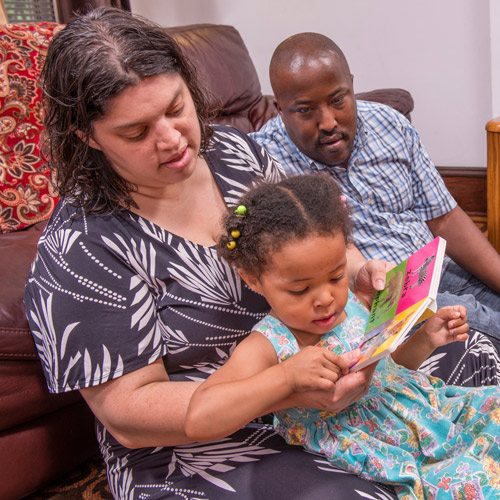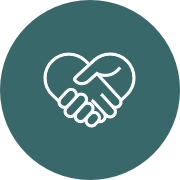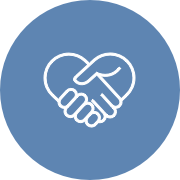
A life (still) in progress
The story of every great couple begins with the “meet cute,” a charming anecdote that shows you two people are supposed to be together. Antjuan and Iggy met cute. They were friends as children, and then Iggy left to live with her family in South America. When she returned as a teenager, Antjuan saw her for the first time and …
“I couldn’t even talk,” he said. “I turned and ran the other way.”
The next afternoon, milling around a basketball court with their friends, Antjuan couldn’t take his eyes off the girl with the dark hair at the other end of the gym.
“I was trying to get her attention,” Antjuan said. “So I threw the basketball real hard off the backboard, so that it would bounce down to the end of the gym where she was standing. She picked it up and threw it back to me and said: Keep the ball on your side.
“And I was just: SHE TALKED TO ME.”
This is the story of two people who met and fell in love, and wanted to be married and have children. This is the story of two people who saw their children taken away from them, and fought to get them back.
This is the story of Antjuan and Iggy, two people with intellectual disabilities who fought to get married, fought to stay together, fought to have a family — and who are working hard to become good and stable parents in a safe and loving family home with support from RHD.
One day Antjuan and Iggy took their daughter to the hospital. A clinician took note of the fact that the little girl’s parents had intellectual disabilities, and notified a social worker, who examined their case and thought that four children might be too much for parents with Antjuan and Iggy’s challenges.
During a period of assessment and review, the Department of Human Services took Antjuan and Iggy’s children away.
As Antjuan and Iggy began working to get their children back, Community Behavioral Health (CBH), the group contracted by the City of Philadelphia Department of Behavioral Health and Intellectual disAbility Services (DBHIDS) to provide mental health and substance abuse services, approached RHD about supporting Antjuan and Iggy in a residential setting as they worked to achieve self-sufficiency and stability as parents. RHD stepped forward to coordinate with Department of Behavioral Health and the Department of Human Services, and everyone worked together to establish the proper level of support for Antjuan and Iggy.
The best fit for them was RHD’s Mandela program, which specializes in community living arrangements for adults who have special mental health needs and provides supervised programs in daily living skills, behavior management, a range of clinical treatment interventions, personal care management, community integrated activities and vocational skills.
“Oh, I didn’t know where to start,” said Mandela Director Raquel Tilley. “We don’t typically work with families. We went through a lot of work and discussion to create a well thought-out plan for what they’d need. This is a rare situation. But eventually we came to look at it like this is a family unit that needs support — and we knew we could provide support for them.”
Antjuan and Iggy’s situation has always been rare. When they first began their journey of courtship, marriage and a life together, their story was chronicled in the documentary Antjuan and Iggy: A Life in Progress. They often dealt with the stigma that they couldn’t sustain a life together.
“We fought to get married,” Antjuan said. “So many people didn’t think it was possible, because we had a disability. I think everybody was scared. We knew it would be a struggle, but …”
“We fell in love,” Iggy said, finishing his sentence. “We wanted to be together. Why can’t we?”
With support from their families, Antjuan and Iggy recently celebrated their 19th anniversary. They are regular speakers in the “Speaking for Ourselves” program, where they tell their personal story as motivational speakers.
“People wondered how society would look at us,” Iggy said. “And we thought: We’re fine. We didn’t really care how the world would take it.”
“I always tell him I want to clone him — he’s the perfect husband,” Tilley said. “He does everything for his wife and his kids. He’s a very good husband; they love each other very much.”
Having children was something else. They shared the news that Iggy was pregnant to their families over Thanksgiving. Their reaction was, well …
“I learned maybe the holidays was not the best time to break news like that,” Antjuan said, with a laugh.
Benjamin, now 10, was born soon after. Then came Donovan, 8; Faith, 6; and Hope, 3. Everyone shared the same concern: Four children are immensely challenging under the best of circumstances. How would Antjuan and Iggy manage it?
Today Antjuan is diplomatic when he discusses the loss of their children.
“We understood that people had questions,” he said, slowly, measuring his words. “People have always questioned us. But we love our kids. We want to be good parents more than anything. We would do anything for our kids.
“And we would have done anything to get them back.”
* * *
When Antjuan and Iggy began the long and arduous journey of reuniting their family, they searched for a provider who would not only support them residentially, but support them as they worked to get their children back and support them as parents in their home.
“RHD worked with us so that me and my wife could support our family,” Antjuan said. “They supported us when we needed it.”
Antjuan and Iggy live in a home with 24/7 staff. RHD supported them as they went through the necessary steps to get their children back. They went to family school to take classes on parenting, and RHD staff worked to provide them with an environment that would empower them as they worked on their parenting skills.
RHD does not help Antjuan and Iggy directly in parenting the couple’s children. But RHD does provide safe and stable residential support in which the family can flourish.
“Antjuan makes mistakes, but he’s learning,” Tilley said. “The biggest thing is that both of them want to spoil their children. I mean, of course they do. But we worked with them on setting boundaries and having discipline.
“You want to work on things, but in a way that supports them as people and as parents. That’s RHD’s philosophy — we do not treat people like they’re ‘less than.’ They are on their journey, and they can do it with the right support.”
The children stayed with Iggy’s mother in a foster care arrangement. The children could visit, but they always had to leave. And it broke Antjuan and Iggy’s heart every time.
“Those kids never wanted to leave,” said Margo Johnson, Mandela medical coordinator. “They wanted to be with their parents. And the grandparents were wonderful. They could not have been more supportive. Antjuan and Iggy understood this was something they had to go through, but it was hard to explain to the kids. None of them wanted to go. Antjuan would sit with them and talk and tell them what they had to do. But, oh, it was hard.
“Children are better off with their parents — as long as they are in a happy and safe environment. And Antjuan and Iggy make it a happy and safe environment for their kids.”
Finally came the day Antjuan and Iggy stood up in court and petitioned to have their children come back home. Most of their RHD staff went with them. Antjuan remembers the judge reading the ruling, remembers his head swirling as he felt like it was going his way but refusing to be optimistic as he heard what felt like an avalanche of legalese (“big court words,” as Antjuan put it) until the judge said: “Your children can come back home now.”
“It was the best feeling in the world,” Antjuan said. “To sit in that courtroom, and have the judge say you can get your kids back … I didn’t know what to do. I wanted to hug the judge.”
It was Thanksgiving, toward the end of dinner, when for the past few months it was time to get the kids dressed and out the door to go back to their grandparents’ house. On this day, they stayed. Antjuan tried to say something about how grateful he was that his children didn’t have to leave, but he couldn’t find the words. Iggy held his hand and they both wept.
“We had a bunch of staff there for Thanksgiving, and I mean when they started crying, everybody started crying,” Johnson said. “None of the staff wanted to leave. We all wanted to spend the day with them. I went home and told my family: I just had the best Thanksgiving ever.”
Ina Raysor is the project director at Mandela who today takes the lead on supporting Antjuan and Iggy in their home, with their children. She can see a day when they’ll be independent, especially as their children get older. But for now, she’s glad to be part of their family.
“I feel like we’re helping make a family, helping make a home for Antjuan and Iggy and their children,” Raysor said. “It’s not always easy, but I think they know how much we care about them.”
They do.
“We’ve had some struggles in our lifetime,” Iggy said, as she gathered up Hope in her arms. “But we’re doing good. The staff is on our side; they’re with us. This is the best place we’ve ever been.”


